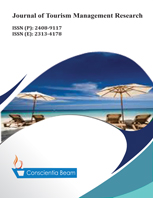Rural tourism and local authority satisfaction: Social, economic, and environmental effects
DOI:
https://doi.org/10.18488/31.v12i1.4088Abstract
The research examines rural tourism and local authority satisfaction and its social, economic, and environmental effects. The Republic of Serbia, with its scenic surroundings and historical sites, offers enormous potential for the growth of rural tourism. In many respects, local government is essential to the expansion of tourism. The purpose of his study is to examine how owners' opinions of the social, economic, and environmental effects in rural tourism regions are perceived. The key issue of the paper is the measurement of the effects of local authority in rural tourism and the perception of rural tourism household owners about the dimensions of sustainable development. The research was conducted using the methodology of partial least squares-structural equation modeling (PLS-SEM). The data for the SEM analysis were collected from a questionnaire among the owners of rural tourist households in the Republic of Serbia. The questions for analysis focused on three components of sustainable development: economic, environmental, and socio-cultural, as well as their impact on satisfaction with local authorities expressed by the owners of rural tourist households. The findings of the research suggest that local self-government units should pay more attention to the economic dimension of the sustainability of rural tourism. This study is one of the first to quantify the impact of local government on rural tourism from the viewpoint of rural tourist household owners using the SEM-PLS approach. For academics and stakeholders in rural tourism, the study's results and conclusions have significant implications and opportunities for the future.

